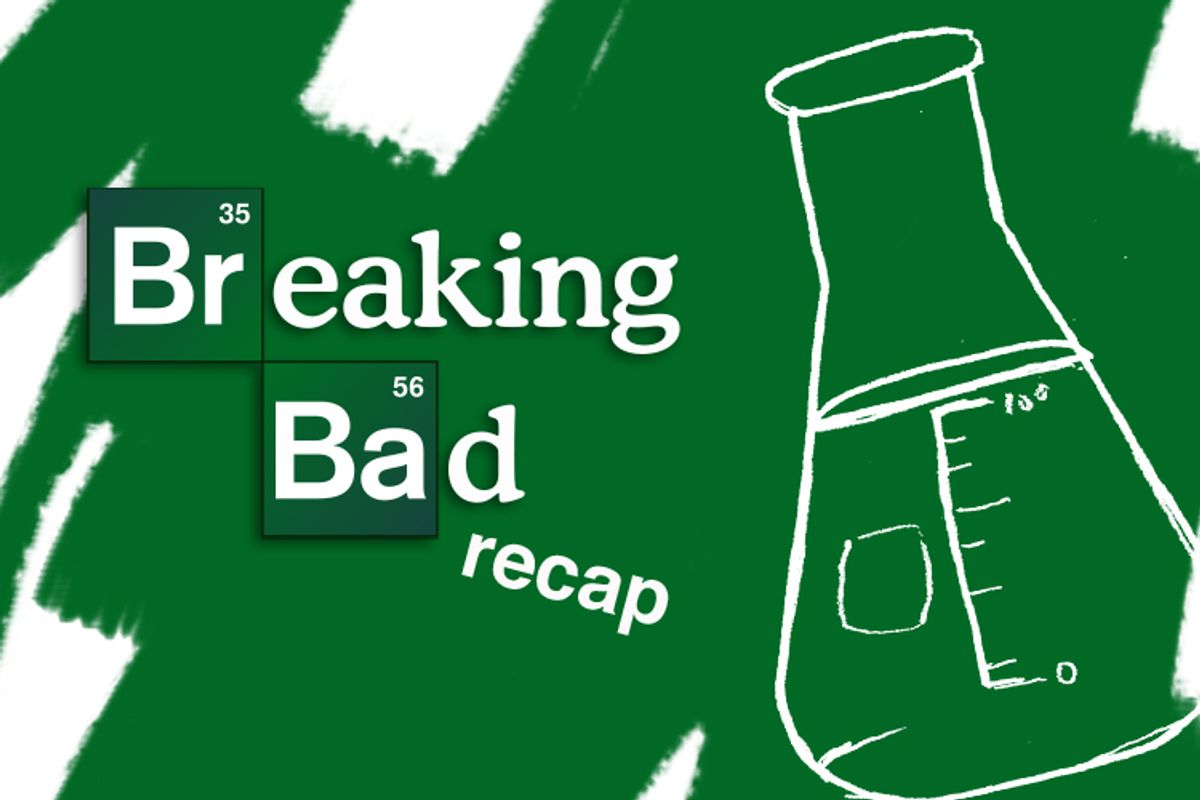[Note: This recap of "Breaking Bad," season four, episode 11, "Crawl Space," contains spoilers. Read at your own risk.]
Sometimes you have to laugh, otherwise you cry. And when things are really, really, really horrible, the laughter is more horrible still. Walter White's laugh at the end of season four's eleventh episode "Crawl Space" was bone-chilling -- a horror movie or film noir laugh; the hideous guffaw of a man in existential panic. Dear lord, I'm still hearing it in my head as I write!
Oh, wait a second, it's not in my head ... the DVR just went off "pause" in the next room. Excuse me while I turn it off.
There. Much better.
What can you say about this episode except "bravo"? We can argue the choices on a granular level in the Letter section -- and I'm sure we will -- but really, I'm having a hard time finding things to nitpick in this episode. By the standards of this series' heightened, pulpy reality, everything worked, and every piece fit.
I didn't care for the way Walter got out of the trip to the industrial laundry by intentionally missing the turn and then swerving his vehicle into the path of an oncoming car, injuring himself and his DEA agent brother-in-law, Hank. As I've indicated in previous recaps, I'm finding it increasingly hard to believe that any other character would believe any lie that Walter White tells, or any "accident" that he contrives to get out of trouble, because he just seems like the worst liar on the planet -- Nathan Thurm-level bad. And yet the sequence worked on its own terms, which were blackly comedic. That's the vein in which "Breaking Bad" often operates -- a vein that also runs through horror and film noir, two genres that this series regularly invokes.
Black comedy makes outwardly ludicrous plot twists feel hilarious, organic and necessary. The black comedy in this episode -- and in season four as a whole -- made a couple of the show's more ridiculous flourishes play brilliantly. One is the conundrum of Walt being asked to chauffeur his DEA agent brother-in-law on unauthorized stakeouts (which was Coen brothers-level crazy). The other is Skyler making an unauthorized withdrawal from the cash stored under the house in order to pay off her ex-lover's tax debts and shield their own ill-gotten gains from government scrutiny. The chain of bad decisions and "acts of god" -- as Saul's muscle later described Ted's collision with the kitchen counter -- that flowed from these two aspects had a bouncy Rube Goldberg inevitability, rather like the strings of horrible misfortunes that befell the miscreants and plotters in the Coens' "Blood Simple," "Fargo" and "Burn After Reading." When the already beaten-up Walt walked into Hank's hospital room with that white bandage on his nose, I just started laughing. It was film noir comedy -- the comedy of karmic payback.
I ragged on Skyler's unauthorized withdrawal last week, but I hereby withdraw my objections. Her financial improvisation was stupid, and implausible from both characterizaation and plot standpoints. (Skyler had been so risk-averse up till then, always a voice of caution, and suddenly she's pulling over $600,000 in cash from under the floorboard and passing it through Saul, who never said a word about it to Walt?)
But it was all worth it to set up that great moment where Walt realized there wasn't enough money to pay for the family's relocation, and Skyler arrived at the exact moment that he realized it and tried to explain why she did it, and Walt realized they were trapped and doomed, and he started to laugh. Ah-HA-HA-HaHHHH! I also loved the way this scene was filmed. The shot-reverse shot pattern of Skyler looking down on Walt and Walt looking up at Skyler suggested a conversation between a man being buried alive and the person who was about to start shoveling dirt onto him. As Skyler wept and Walt cackled, I heard two statements echoing in my head. One was the phrase, "Communication is the key to a good marriage." The other was Albert Brooks' rant to Julie Hagerty in "Lost in America" about the importance of the nest egg.
So where are we now? Hank is targeted for death. Mike is out of the picture -- either dead or so badly wounded that he can't be of much service to Gus, which forces Jesse to step in as head chef. Gus is stronger than ever after eliminating most of his major enemies and manuevering a new chemist -- the now-swaggeringly confident Jesse -- into Walt's old spot. Tyrus, whose smug silence I loathe nearly as much as Walt's arrogance, is poised to become the new Mike, provided Gus doesn't press Jesse into that job, too. Skyler, Walt and their kids are screwed. The only option left at this point is probably real witness location, not the illegal, underground variety that Saul's buddy the vacuum cleaner salesman is selling.
"Breaking Bad" creator Vince Gilligan has said that he enjoys having his staff write the show into corners and write their way out again. This might be the tightest narrative corner in the show's history. Short of painting a new door on one of the walls, Bugs Bunny-style, I don't see how they can extricate the White-Schrader family. Next week can't come soon enough.
What did you think?



Shares